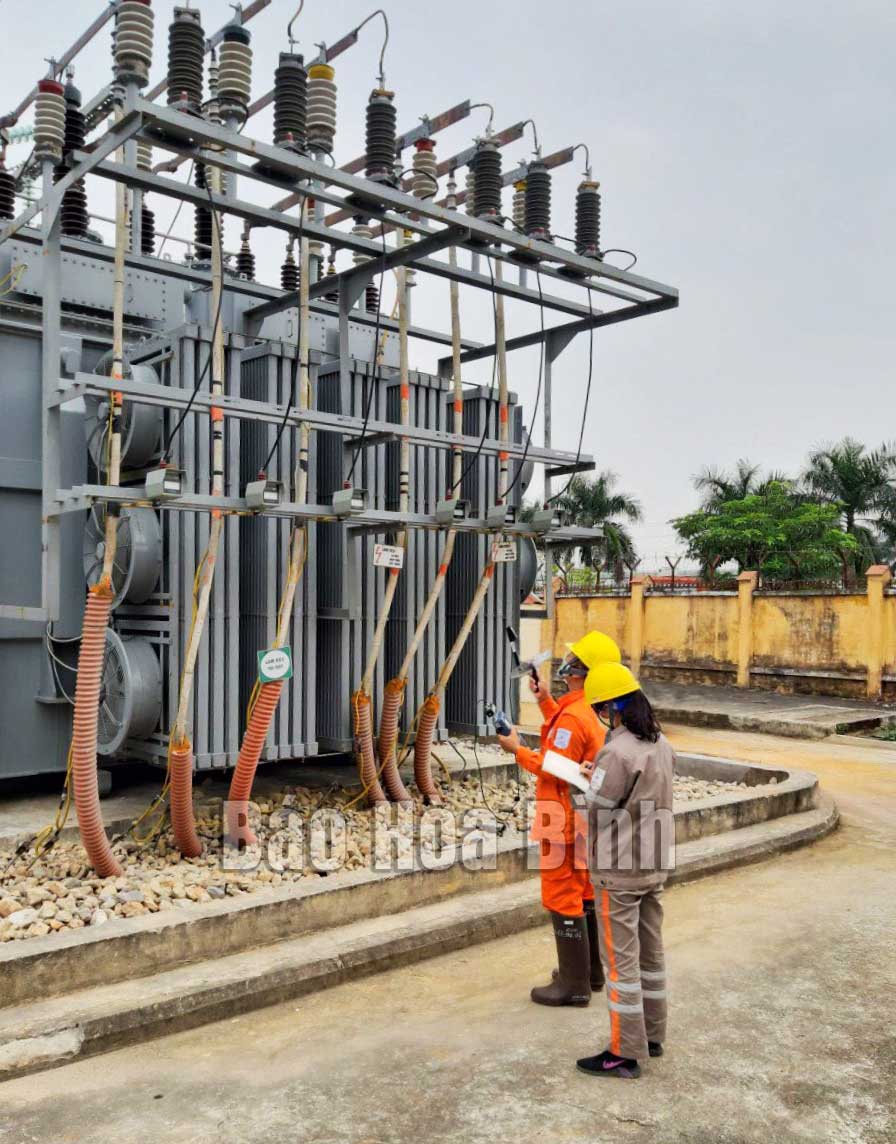
(HBO) – Over the past years, the Power Company of Hoa Binh province (PC Hoa Binh) has actively carried out many measures to develop a smart grid in efforts to optimise electricity consumption, reduce costs, and enhance the power system’s reliability and efficiency.

Workers of PC Hoa
Binh examine an unmanned transformer stations.
Deputy Director of the company Luong Van Phuong
said a smart grid is a system sending electricity from producers to consumers
able to independently monitor and distribute power to achieve maximum energy
efficiency. All facilities of the grid interact with one another to create a
smart power supply system thanks to the application of modern information and
communications technology. To consumers, the smart grid help monitor their
electricity use in different points of time, thus helping change consumption
behaviours and save money.
Given those advantages, PC Hoa Binh has taken
measures to develop a smart grid since 2018, which is also a move to carry out
the Government’s programme on smart grid development.
He noted that the company has worked to apply
science - technology to all activities, from electricity production to grid
management and operation. Softwares have been created for use in management,
e-invoices applied, old electricity meters replaced with electronic ones, and
related services provided online. Uniform measures have been implemented to
improve the reliability and quality of power supply.
In addition, PC Hoa Binh has invested resources
in developing the grid infrastructure and made use of scientific and
technological advances to modernise the grid operation. Notably, a remote
control centre was put into use in July 2018, helping detect and deal with
electricity incidents faster.
Thanks to the active application of new
technologies, the firm has achieved the set targets, thus ensuring the safety,
stability, and reliability of power supply for consumers. Those attainments
form a prerequisite for PC Hoa Binh to boost the smart grid development in the
years to come./.
According to data from the Hoa Binh Provincial Party Committee, the industrial production index for the first six months of 2025 is estimated to have increased by 20% compared to the same period last year. This marks the highest year-on-year growth rate for this period since 2020.
In the first six months of 2025, Hoa Binh province’s export turnover was estimated at 1.145 billion USD, marking an 18.11% increase compared to the same period in 2024. Import turnover was estimated at $ 804 million, a 17.15% increase, which helped the province maintain a positive trade balance.
The lives of the ethnic minority farmers in Tan Lac district have gradually improved thanks to the new directions in agricultural production. This is a testament to the collective strength fostered through the professional associations and groups implemented by various levels of the district’s Farmers’ Union.
With the motto the "product quality comes first,” after nearly one year of establishment and operation, Muong village’s Clean Food Agricultural and Commercial Cooperative, located in Cau Hamlet, Hung Son Commune (Kim Boi district), has launched reputable, high-quality agricultural products to the market that are well-received by consumers. The products such as Muong village’s pork sausage, salt-cured chicken, and salt-cured pork hocks have gradually carved out a place in the market and they are on the path to obtaining the OCOP certification.
In the past, the phrase "bumper harvest, rock-bottom prices" was a familiar refrain for Vietnamese farmers engaged in fragmented, small-scale agriculture. But today, a new spirit is emerging across rural areas of Hoa Binh province - one of collaboration, organisation, and collective economic models that provide a stable foundation for production.
Maintaining growing area codes and packing facility codes in accordance with regulations is a mandatory requirement for agricultural products to be eligible for export. Recently, the Department of Agriculture and Environment of Hoa Binh province has intensified technical supervision of designated farming areas and packing facilities to safeguard the "green passport" that enables its products to access international markets.



